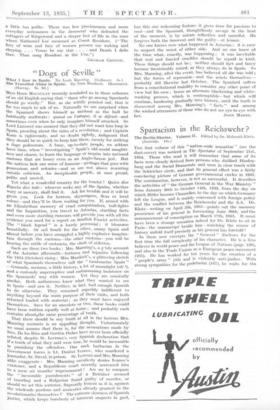"Dogs of Seville " Miss ROSE MACAULAY recently reminded us
in these columns of an old English saying'that " those who go among Spaniards should go warily." But, as she wittily pointed 'out,• that is far too much to ask a us. Naturally we are surprised when 'the Spaniard shows himself as sax/sant as the bull he habitually maltreats : quand on raitaque, ii xc sometimes even when he only imagines himself attacked.So Lord Listowel was amazed that they did not want him long in Spain, prowling about the ruins of a revolution ; and Captain Kane is 'righteously, and no doubt rightly, indignant that they should be so quick to keep him there, merely for striking a dago policeman. A busy, up-to-date people, we seldom have time, when " investigating " Spain's old-world naughti- ness and charm, to learn the language or inquire into national customs that are hoary even as an Anglo-Saxon jest. But the natives lack our sense of humour--Perhaps that goes with Possessions and colonies—and so are not above resenting outside criticism. An inexplicable people, at once proud, Polite and uncivil. • Yet what a wonderful country for the tourist Quien dice Espafia dice todo : whoever seeks any of the Spains, whether Wary or unwary, shall find it. Ask for trouble and it will be skyscrapers, fleas or local given you. Look for horrors, colour—and they'll be there waiting for you. If, armed with an 'Elizabethan memory of cruel conquistadors, bull-fights and the Inquisition, you travel to Asturias, startling facts and even more startling rumours will provide you with all the evidence you need for a report on fiendish Fascist activities. The perennial : it blossoms " black legend " is a hardy 'beautifully. Or sail South for the other, sunny Spain and almost before you have smuggled a highly explosive imagina- tion through the customshe other customs—you will be hearing the rattle of castanets, the clash of stilettos. Such are these two books : Mrs. Manning's, a grisly account Of the Asturian aftermath—tortures and injustice following the 1934 (October) rising ; Miss Murdoch's, a glittering sketch of what Spaniards themselves call the " tambourine Spain " --Granada, snefiana, a little history, a lot of moonlight (old!), and a curiously unperceptive and embarrassing insistence on the Spaniards' way with women. Yet they are comically similar. Both authoresses knew what they wanted to see in Spain—and saw it. Neither, in fact, had enough Spanish to do otherwise. They remained superbly indifferent to anything beyond the main purpose of their visits, and both returned loaded with material ; so they must have enjoyed themselves. Save for an anecdote or two, these books could have been written equally well at homeand probably each contains aboutsthe same percentage of truth. That there should be any truth at all in the horrors Mrs. Manning recounts is an appalling thought. Unfortunately we must assume that there is, for the accusations made by Sres. De los Rios and Gordon Ordax have never been officially refuted, despite Sr. Lerroux's very Spanish declaration that if a tenth of what they said were true, he would be inexorable in punishing the offenders. One such barbarian in the Government forces is Lt. Dmitri Ivanov, who murdered a Lerroux and Mrs. Manning journalist, Sr. Sirval, in prison. Sr. cavalierly denies Ivanov's alike exaggerate : Mrs. Manning existence, and a Republican court recently sentenced him to a mere six months' imprisonment ! Are we to compare the " inexorable punishments" of • a Britisher accused of brawling and a Bulgarian found guilty of murder, or should we set this sentence, flagrantly lenient as it is, against the wholesale pardons and amnesties already granted to the revolutionaries themselves ? The extreme slowness of Spanish justice, which keeps hundreds of innocent suspects in gaol, has this one redeeming feature: it gives time for passions to cool—and the Spaniard, thoughtlessly savage in the heat ofo the moment, is by nature reflective and merciful. He forgives both the innocent and the guilty—at leisure. No one knows now what happened in Asturias ; it is easy suspect the worst of either side. And no one knew at the time what, exactly, was happening ; it was inevitable that real and fancied cruelties should be repaid 'in kind. These things should not be ; neither should fact and fancy become inextricably mixed, as they always do in Spain. So Mrs. Manning, after the event, has believed all she was told ; but the forces of repression—and the rebels themselves— probably did likewise last October. The Spaniard suffers from a constitutional inability to consider any other point of view but his own ; hence an alternate blackening and 'white- washing process, which is contemptible--but which will continue, hardening gradually into history, 'until the truth is discovered among Mrs. Manning's " facts and among the wicked utterances of those who do not see eye to eye with






































 Previous page
Previous page